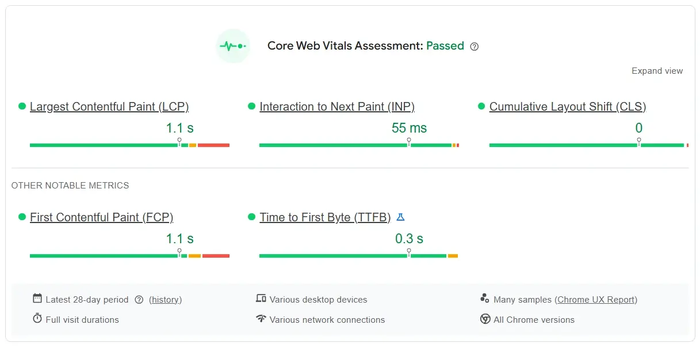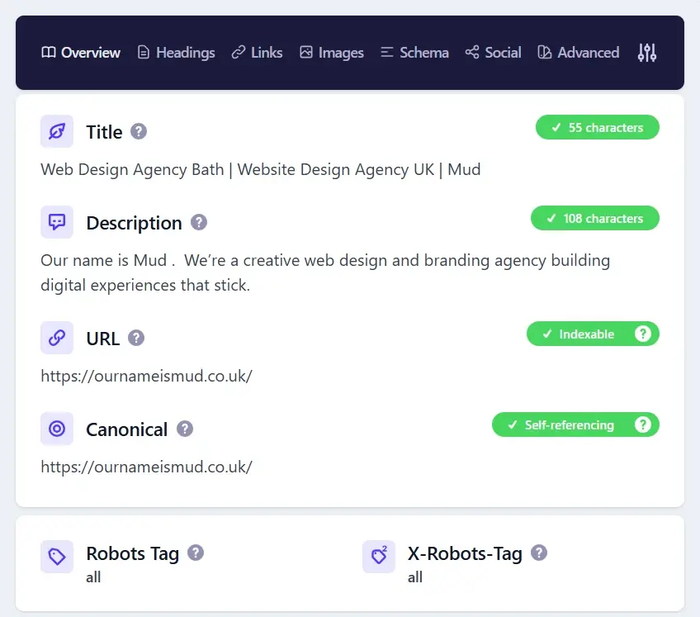A Quick Start Guide to Website Management Tools (Plus Tips!)
From the Journal – Posted 10.02.2025

Websites end up feeling outdated and rusty around the edges when they’ve been left to their own devices for a little too long.
Neglect a website’s basic maintenance needs, and your SEO rankings, website traffic, and any quality user experience will slowly fade away.
Not to mention the backend will start creaking under the pressure if you fall behind on updates; a fast-track to your website crashing at the most inconvenient time.
Your website won't grow on autopilot. Like your business, it needs continual oversight and management to stay secure, fast and effective. Get to know the essential tools, and maintaining your website and maximising your marketing efforts gets a whole lot easier.
This is not an owner’s manual. It's more of a quick start guide to website management. We’ll introduce you to the tools we use day-in, day-out, plus some tips for using them effectively. By the end, you'll be up to speed with the basics and getting your website travelling in the right direction.
Essential Website Management Tools in 2026
Content Management System (CMS)
The day-to-day management of a website would be all but impossible without an effective content management system. Beautifully conceptual branding, complete with sensory motion design touches, will only take you so far; a website is only as good as the content published on it.
The purpose of a CMS is straightforward: it gives website, content and marketing managers a streamlined and accessible means of managing the content published on your site without the assistance of a web developer.
From keeping key landing pages up-to-date to publishing new pages to promote products, services or ideas, a CMS should support your marketing and business objectives, not hinder them.
Craft CMS
Our CMS of choice is Craft. It's the platform all our websites are built on.
We prefer Craft CMS over something like WordPress because of its flexibility. It's not template-led, so we find it's a good solution for most businesses, whether local brands or multinationals.
It has a clean and intuitive control panel, making website and content management simple and clear for marketing managers. And its modular architecture and extensive and well-supported plugin ecosystem give developers complete freedom to build bespoke digital experiences.
💡 Further reading: Craft CMS FAQs: What You Need to Know
For eCommerce, Shopify is built for effortless sales and product management, with intuitive tools to create highly flexible and targeted stores to promote and sell your products and services to your target audience.
PageSpeed Insights
Your website is in the business of attention. It should take every opportunity to connect with your customers. To do this, it must load your content quickly and effectively, engaging them as soon as they land on your site.
The slow rendering of page elements can distort and disrupt the intended user experience. This directly impacts user perception of your brand and their behaviour on your site, and has negative effects on:
- Conversion rate
- Bounce rate
- Search rankings
- User experience
Google’s free tool - PageSpeed Insights - allows you to quickly evaluate the loading time of your website, its performance and behaviour on desktop or mobile devices.

Enter your URL, and it will generate an assessment, providing overall scores for the performance, accessibility, best practices and SEO, and a clear breakdown and explanation of the performance issues it finds on your site.
By identifying issues, you can quickly take actions that will optimise and improve your site's load times and responsiveness.
In this attention economy, speed matters, and PageSpeed Insights will show exactly where you’re losing potential customers to poor performance.
Analytics Tools
Understanding the behaviour of users visiting your site is crucial to an effective marketing strategy.
There are innumerable website analytics tools out there. Some are better than others. Some are expensive, some are cheap. But here are our favourites:
Google Analytics 4 (GA4)
GA4 is the most widely used analytics platform for a reason: it’s powerful, flexible and integrated with the wider Google ecosystem. In short, GA4 helps you understand where your visitors are coming from, how they move through your site, and whether they complete the actions you want them to.
But that power does come with some complexity. GA4 - successor to Universal Analytics - isn’t always intuitive, and there is a learning curve. That said, with a little training, it unlocks a comprehensive view of performance across channels, making it absolutely invaluable.
Microsoft Clarity
If GA4 tell you what your users are doing, Microsoft Clarity helps you understand how they’re doing it.
Microsoft Clarity is a free tool that uncovers how people are experiencing your website through screen recordings, heatmaps and interaction tracking. It helps you see where they hesitate, where they scroll, and where they drop off.
It’s particularly useful for identifying usability issues, friction in user journeys, and content that isn’t performing as expected.
An alternative to Clarity is Hotjar. It offers a similar set of behavioural insight tools, alongside features like on-site surveys and feedback widgets. However, HotJar is a paid tool, and we find that most website owners get everything they need from Clarity.
Fathom Analytics
In many ways, Fathom Analytics is similar to GA4. But it comes at it differently, stripping back your analytics to the essentials.
It’s privacy-focused, lightweight and deliberately simple. Instead of endless reports, it surfaces the core metrics most organisations actually need: traffic sources, popular pages and goal completions in a clear, accessible interface.
For smaller sites, content-led brands, or organisations that want meaningful insights without the overhead of complex configuration, Fathom provides a refreshingly straightforward alternative.
SEO Tools
Can the people looking for the type of products, services, or ideas you offer find you online?
According to Serpwatch, online searches generate a third of all global web traffic, with organic search generating between 47-53% of all website traffic across industries.
Beyond assessing your website traffic with an analytics tool, an SEO tool is a marketing must-have to help maximise visibility.
💡 Further reading: What is Technical SEO? The Basics for Website Audits
Ahrefs
Ahrefs is our SEO intelligence platform of choice, and it’s one of the most comprehensive available.
In short, it gives you visibility into how your site performs in search, what your competitors rank for, and where opportunities exist to grow traffic.

Ahrefs helps you understand not just how your site performs, but why. It’s particularly valuable when shaping content strategy, identifying link opportunities, or benchmarking against competitors.
SEMrush offers a comparable platform with a slightly broader marketing feature set, including PPC research, site auditing, and competitive insights. The choice between the two often comes down to workflow preference and reporting needs rather than capability.
Screaming Frog
Screaming Frog is a little different. It’s less about strategy and more about forensic analysis of your technical SEO.
It crawls your site the way search engines do, surfacing technical issues that can quietly undermine performance. Think broken links, duplicate content, missing metadata, redirect chains and indexation problems.
For developers, SEO specialists, and anyone responsible for site health, Screaming Frog is the gold standard for understanding how search engines actually see your website.
Google Search Console (GSC)
Google Search Console is the foundation every site should have in place. There’s no excuse.
It’s free and provides direct insight from Google into how your site appears in search results. It’s often the first port of call when identifying or even diagnosing SEO issues.
GSC surfaces which queries trigger impressions, how often users click through, and whether technical issues are preventing pages from being indexed.
It’s not a full SEO platform. But it helps you understand what Google is seeing and understanding. It’s one of the most valuable data sources available to any organisation with a website.
Detailed SEO Extension
The Detailed SEO Extension is a simple browser plugin that gives you instant visibility into the on-page structure of any website.
We love it because it very simply surfaces key SEO elements - headings, metadata, structured data, and indexability signals - without needing to dig through source code or specialist software.

Want to see how your H tags are structured on a page? Get the Detailed SEO Extension.
That makes it useful not only for SEO practitioners but also for content teams and marketers who want a quick sense of how a page is constructed. It’s the #1 SEO tool for finding quick wins.
Top Tips for Easy Website Management
Select the Right Tools
While some tools are versatile and free-to-use, others might need more evaluation on your part to determine whether they are cost-effective, complex, simple or specific enough for your particular website.
How will they integrate and scale with your business? Is there adequate guidance to support you or your team in learning how to use them effectively?
Don't just get every tool all at once. Spend time researching what you need and how best to get that information. Putting too much data at your fingertips will just stop you from seeing what's truly important.
Be Consistent
Websites get challenging when left to their own devices for long periods; they fall behind on crucial updates, lose relevance to algorithms and the content becomes dated.
Reporting on and auditing the performance of your website should be a monthly task at a bare minimum. Ideally, you'll have a dashboard and robust reporting structure, as well as weekly checks to identify issues with things like technical SEO.
Keep Track of Publishing
Have systems in place to approve, publish and audit content accordingly. Whether you are the sole content publisher or there are multiple website managers publishing and editing content daily, webpages that go unaccounted for can cause headaches down the line.
Set alerts!
With the last two tips in mind, do yourself a favour and set up alerts and reminders to relieve some of the mental load. We find Slack or email works well.
The goal here is to manage your website proactively and consistently, and so reduce the time you spend solving larger issues that could have been caught sooner.
In short…
As a central digital asset to your business, you will reap the rewards of a website that is ready-to-go for every website user it greets.
Effective website management can amplify your marketing and business activity in ways that are both cost-effective and impactful; it’s just about getting to know the right tools for the job.
…can we help you?
If you need some support in auditing your website’s performance, or need expert assistance in managing and optimising your website, get in touch with the Mud team today.
We can provide an assessment of your website in its current state, and have a range of support packages should your business require a more robust action plan to get your site into shape, even if we didn’t build it.
If you need a more resilient and reliable service when it comes to maintenance, reach out to us, and we’ll work with you to find out how we can better manage your site moving forward.